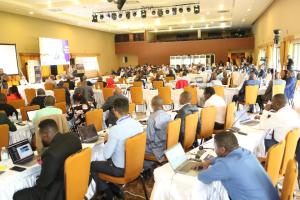Africa Builds Research Readiness for Future Filovirus Outbreaks
Over two hundred Scientists and Research and Development (R&D) focal points gathered in Uganda to tackle the pressing need to enhance research readiness for potential filovirus outbreaks across Africa. The workshop, which took place from 20th to 22nd February in Kampala, was jointly hosted by the World Health Organization (WHO) and the Ministry of Health Uganda.
Guided by the WHO’s R&D Blueprint for Epidemics, the workshop brought together participants from 19 African countries at risk of filovirus outbreaks. Its main objective was to establish a network of principal investigators and research centers with standardized protocols and procedures. This will bolster countries’ preparedness and capacity to carry out effective clinical trials in response to filovirus outbreaks, as well as vaccines and therapeutics.
Honorable Hanifa Kawooya, State Minister for Health in charge of General Duties and chief guest at the meeting, underscored the workshop's significance: "It is vital to address the urgent need for timely deployment of experimental measures in health emergencies is vital. Together, we are advancing research readiness for equitable access with safety & efficacy."
The WHO R&D Blueprint for Epidemics is a global strategy and preparedness plan to address highly infectious diseases and strengthen the emergency response by fast-tracking the availability of effective medical technologies that can help patients during epidemics. With a broad global coalition of experts and WHO as convener, the Blueprint encompasses all actions needed to implement critical research in a safe, effective, and timely way.
During the workshop, Dr. Mike Ryan, WHO Executive Director for Health Emergencies, emphasized the workshop's contribution to global health security: "The outcomes of this workshop will set a pivotal course for future clinical research strategies, enhancing our collective capacity to respond swiftly to potential outbreaks."
The workshop focused on evaluating candidate vaccines and therapeutics, reviewing trial protocols, addressing operational challenges, and formulating a roadmap for establishing a network of principal investigators. This was followed by WHO’s proposal for virtual debriefings to provide the necessary support for implementing recommendations.
Dr. Yonas Tegegn Woldemariam, WHO Representative to Uganda, emphasized the importance of collaboration and unity in preventing health emergencies. "United in our mission, WHO Uganda remains steadfast in prioritizing swift responses to filovirus outbreaks through coordinated research, innovation, and the implementation of pre-approved protocols,” he said. “This commitment ensures effective global collaboration and the timely deployment of vaccines and therapeutics,” added Dr Yonas.
Dr Abdou Salam Gueye, the Regional Director for Emergencies at the WHO Regional Office for Africa urged country emergency programme managers on the way forward for implementing the studies and monitoring progress. They subsequently expressed optimism that countries would be able to make the most of this opportunity.
The Clinical Research Workshop on Filovirus is a beacon of hope for global health preparedness. This workshop and others planned for the future, build on existing frameworks, including the WHO-Strategic Research Agenda for Filovirus Research and Monitoring (WHO-AFIRM) Roadmap, leveraging insights from consultations and lessons learned in countries such as Uganda. Through collaborative trial platforms, particularly in resource-constrained settings, the workshop consolidated global clinical research efforts and enhanced pandemic preparedness.
Communications Officer
WHO Uganda
Email: tcheutchouae [at] who.int (tcheutchouae[at]who[dot]int)
Communications Associate
WHO Uganda Country Office
Email: afwcougcom [at] who.int (afwcougcom[at]who[dot]int)
Phone: +256740487734
